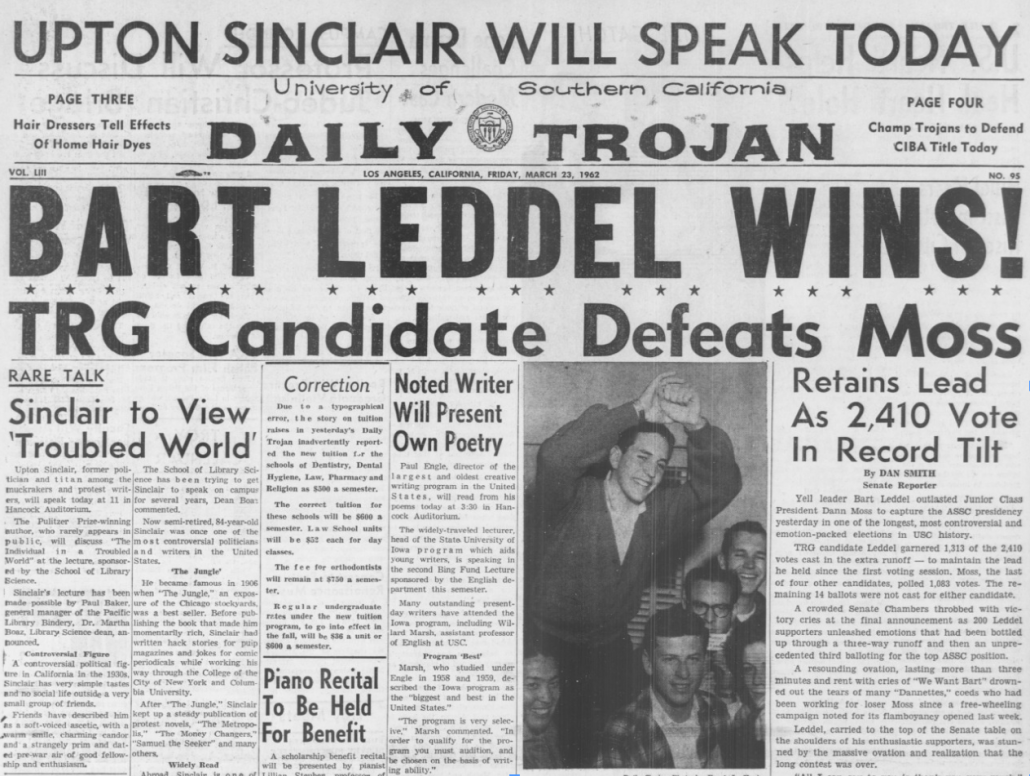How USC’s 1962 student elections created the path to Watergate

Student government elections used to be more than platform points and debates.
When running for student senator in 1962, Donald Segretti entered a race where disruption campaigns, spying and cheating were fixtures in USC’s student politics. With headline-grabbing accusations from candidates and open warfare between student political groups, the elections erupted with controversies unprecedented in today’s student government.
The ’62 student elections featured Segretti and other students who’d work for President Nixon’s reelection campaign a decade later — a campaign notable for its political sabotage and the Watergate scandal.
Cheating to win was a tactic Segretti and the others learned during their undergraduate years.
As a member of Trojans for Representative Government, Segretti met other future Watergate figures in the group, including White House Press Secretary Ron Ziegler and Nixon’s deputy assistant President Dwight Chapin — altogether known as the “USC Mafia.”
During the student elections, Chapin and Segretti engaged in what Washington Post reporters Bob Woodward and Carl Bernstein would later call “ratfucking,” a term used by USC students to describe gaining a political advantage through dirty tricks and cheating.
According to the two reporters, members of TRG stuffed ballot boxes with false votes, planted spies in other student political organizations and spread false campaign literature about other candidates during the student elections.
Moving from college politics to the national presidency, nothing changed. While working to dismantle Democratic candidate Edmund Muskie’s presidential campaign in 1972, Segretti sent a forged letter to the press alleging Muskie was prejudiced against French Canadian Americans. Segretti later pleaded guilty to the Watergate-related charges and served four months in jail.
Segretti’s tumultuous senatorial campaign was a product of USC’s system for student government in the ’60s.
Known as the Associated Students of Southern California, USC’s student government was made up of students from multiple student political parties, including TRG, the Representation Party and the underground Theta Nu Epsilon. Instead of having 12 senators as the current Undergraduate Student Government does, ASSC’s legislative body consisted of senators who represented specific academic majors.
Political parties openly clashed with each other in Spring 1962, unafraid of singling out opposing candidates to better their own chances.
TRG Chairman Chapin, who later served nine months in prison for his involvement with Watergate in 1974, attacked USC presidential candidate Gil Garcetti by claiming his filing as “independent” was inaccurate due to his membership to the Chi Phi fraternity, while candidate Dann Moss accused Garcetti of using “circus techniques” in his campaign.
The platform points for the 1962 presidential candidates serve as a testament to their time. Candidates sought to extend library hours to 11 p.m., develop programs for “foreign” students and create an accessible student directory. However, similar to today, many candidates called for greater representation of student groups in the student government.
With distrust surging between opposing political parties, student groups worked to prevent outsiders from gaining information. Chapin sparked protests during the election by attempting to rework TRG’s constitution to bar students from joining who had previously worked with any other political party on campus.
“With the type of underground political situation that exists on this campus, we would be infiltrated and broken by [Theta Nu Epsilon] if we opened our ranks to all students,” Chapin told the Daily Trojan in 1962. Chapin also publicly blamed TNE as the main source of organizational difficulties for the Representation Party.
Attacks between parties grew worse as the voting period drew nearer.
In a rally for presidential candidate Moss, two students rioted by throwing eggs at Moss and other rally speakers, which was rumored to have been caused by other “unfriendly political factions,” though not proven. A sound truck for presidential candidate Garcetti had its sign “torn down and burned and the truck itself mobbed” and no suspects were found, according to a Daily Trojan article.
On March 15, the first day of voting, controversy broke among students and political groups over illegal votes and improper ballot procedures. This included the president of TRG, who complained he witnessed votes being counted without confirmating the identity of the students, similar to the actions Watergate reporters Woodward and Bernstein had later accused TRG of doing.
After winning a three-way runoff vote, TRG was victorious — TRG candidate Bart Ledder captured the ASSC presidency and Segretti won the senatorial position. The Daily Trojan described the election as “one of the longest, most controversial and emotion-packed elections in USC history.” In the story recounting the announcement of the result, the Daily Trojan wrote that “a crowded Senate Chambers throbbed with victory cries” as the TRG candidate was “carried to the top of the Senate table on the shoulders of his enthusiastic supporters.”
TRG’s victory reached further than USC’s student elections. With the line between aspirations and ethics now blurred, members of TRG understood what political success took. As Chapin, Segretti and other members of the USC Mafia made their way to the national stage, the ’62 ASSC elections served as a microcosm of what would take place in the future on a much larger scale.

